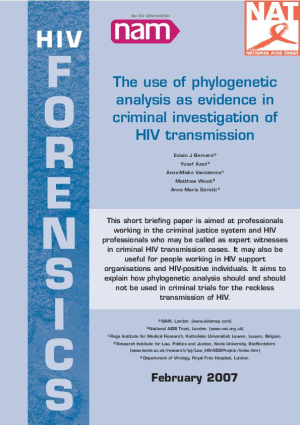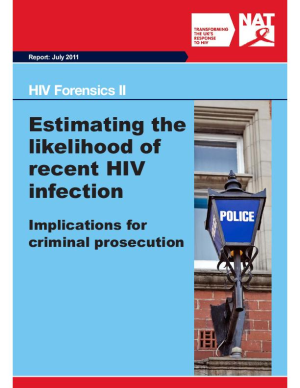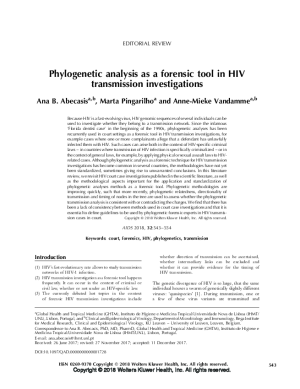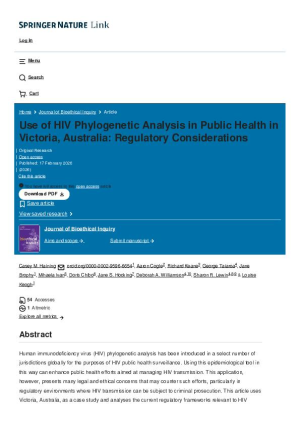Aimed at professionals working in the criminal justice system and those who may be called as expert witnesses in criminal trials, the briefing explains how phylogenetic analysis should and should not be used in criminal trials for the reckless transmission of HIV.
Scientific evidence in a legal context
Phylogenetic science and HIV
HIV forensics: pitfalls and acceptable standards in the use of phylogenetic analysis as evidence in criminal investigations of HIV transmission
Considers the usefulness of phylogenetic analysis in HIV criminal trials, finding that phylogenetic analysis cannot prove that HIV transmission occurred directly between two individuals. Explains that phylogenetic analysis can exonerate individuals by demonstrating that the defendant carried a virus strain unrelated to that of the complainant.
- Alternative links
- Français, Español, Русский, HIV Medicine Wiley Online Library
Claims that phylogenetic analysis can prove direction of transmission are unfounded, say experts
Questions the merits of a phylogentics article published in Proceedings of the National Academy of Sciences, and warns against relying on its conclusions.
HIV Forensics II – Estimating the likelihood of recent HIV infection — implications for criminal prosecution
Considers the validity and meaning of scientific tests (Recent Infection Testing Algorithm) to estimate the likelihood of a recent infection in persons diagnosed as HIV positive in the context of prosecutions for HIV transmission.
High rates of forward transmission events after acute/early HIV-1 infection
Uses a population-based phylogenetic approach to characterize HIV transmission dynamics in Quebec. Found early infection accounts for approximately half of onward transmissions. Suggests therapy at early stages of disease may prevent onward HIV transmission.
Phylogenetic analysis as a forensic tool in HIV transmission investigations
A review of HIV court case investigations published in the scientific literature, as well as the methodological aspects important for the application and standardisation of phylogenetic analyses methods as a forensic tool. Concludes that there has been a lack of consistency between methods and that it is essential to define guidelines to be used by phylogenetic forensic experts in HIV transmission cases.
Community Insights in Phylogenetic HIV Research: The CIPHR Project Protocol
Protocol for engaging community activists living in Nairobi, Kenya in a knowledge exchange process: Drawing upon a community-based participatory approach, the CIPHR project will (1) explore the possibilities and limitations of HIV molecular epidemiology for key population programmes, (2) pilot a community-based HIV molecular study, and (3) co-develop policy guidelines on conducting ethically safe HIV molecular epidemiology. Critical dialogue with activist communities will offer insight into the potential uses and abuses of using such information to sharpen HIV prevention programmes. The outcome of this process holds importance to the development of policy frameworks that will guide the next generation of the global response.
Use of HIV Phylogenetic Analysis in Public Health in Victoria, Australia: Regulatory Considerations
This article uses Victoria, Australia, as a case study and analyses the current regulatory frameworks relevant to HIV transmission and explores how these may influence the future implementation of phylogenetic analysis in this setting. The article concludes by offering a series of regulatory recommendations including considerations relevant to law and policy reform; procedures and practice; education and guidance; and community engagement and research.







